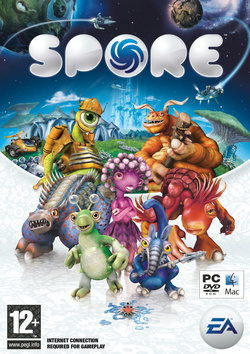Interviews: Will Wright Reacts To Critical ‘Spore’ Reviews, Reveals Personal Playing Style

Spore article from MTV Multiplayer Blog (archived version), written by Stephen Totilo.
EA’s biggest PC game of the year and the brainchild of renowned game designer Will Wright, “Spore” hits store shelves today. The game has won Best of E3 awards and been lavished with positive pre-release coverage in the gaming and mainstream press.
So why is it getting 8s and 9s rather than 10s? And what does Wright make of reactions such as that of the New York Times‘ review, which concludes:
“Now if Mr. Wright and the Maxis team just take another few passes through Spore’s later stages and release a big revision patch next year, they may finally end up with a game to match the stellar toy they have already unleashed.”
On Friday, I had a chance to talk to Wright about the response the game has been getting, giving him a chance to clarify the goals of his design team and to reveal how he’s playing “Spore.” (As the week progresses, we’ll be posting Wright’s thoughts on each of the game’s stages, which he also shared during the interview.)
I read Wright that Times paragraph and this is what he said:
“I haven’t read that, but it’s interesting. The feedback we’re getting from people is that everyone has some level they like and some level they don’t like. A lot of the reviews I’ve read have said that the Space Stage was far and away the best and they were disappointed by the earlier stages because they were too simple. Other people have said the Creature Stage is their favorite and that the Space Stage seems too complicated. We knew, since we were using different genres with every level, that everyone would have ones they really clicked with and ones they didn’t. We’ve pretty much seen that. There hasn’t been any consistent feedback. Some people have said the Civ phase is the best.”
When I talked to Wright, I had played deep into the Space Stage, which I was enjoying. But I had seen complaints from hardcore game reviewers and message board posters that all of the stages have less complex gameplay than many gamers had hoped. As wonderful as the content creation and sharing options are, the one consistent complaint I’ve seen is that the gameplay seems to have been “dumbed down” for the sake of appealing to a more casual audience. Was it?
“I’d say that’s quite accurate,” Wright told me. “We were very focused, if anything, on making a game for more casual players. “Spore” has more depth than, let’s say, “The Sims” did. But we looked at the Metacritic scores for “Sims 2″, which was around 90, and something like “Half-Life“, which was 97, and we decided — quite a while back — that we would rather have the Metacritic and sales of “Sims 2″ than the Metacritic and sales of “Half-Life.”
And one way of getting there is to present a narrower range of options than a hardcore player might be expecting?
“Yes,” he said. “Part of this, in some sense was: can we teach a “Sims” player to play an RTS [or Real Time Strategy game]? … I think the complexity we ended up with was toward that group.”
As simplified as Wright says “Spore” gameplay is, it should be noted that when you ask him how he’s playing the game, he proves that one can find a complex approach. I asked what he’s been up to in the game. He replied: “I like the Space Stage a lot. It’s kind of like ‘The Sims’ in that you can have multiple saved games and have them interact with each other. You can start one game, let’s say as the Klingons, and go all the way up and have the Klingon empire. And then have the Romulan empire and go meet the Klingons and start a war. I’ve always liked that kind of high level storytelling where I have multiple saved games interacting.”
The doesn’t sound simple at all.
“Spore” is out today for Mac and PC. You decide if it gets the job done.











